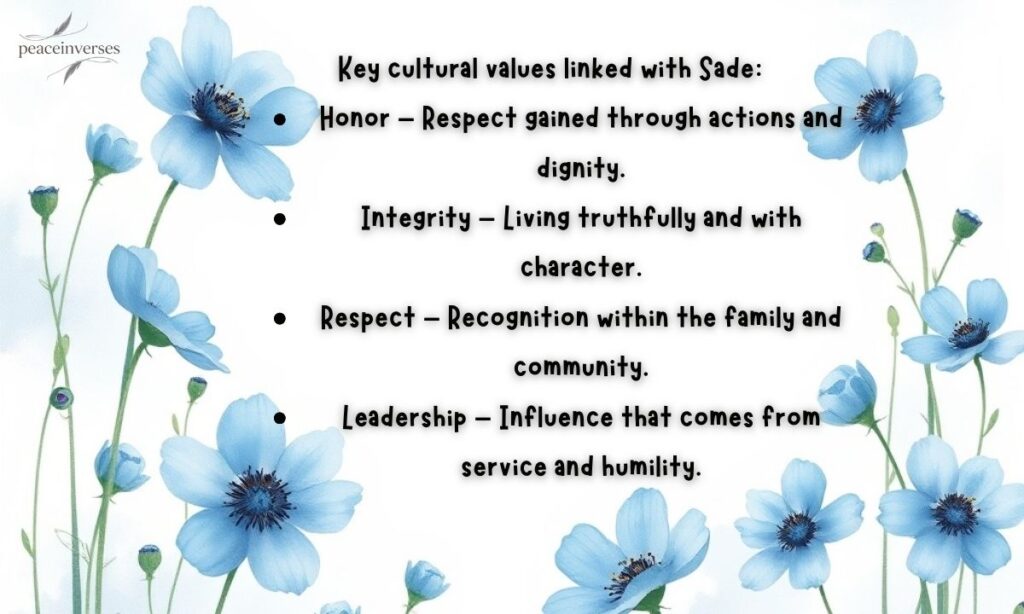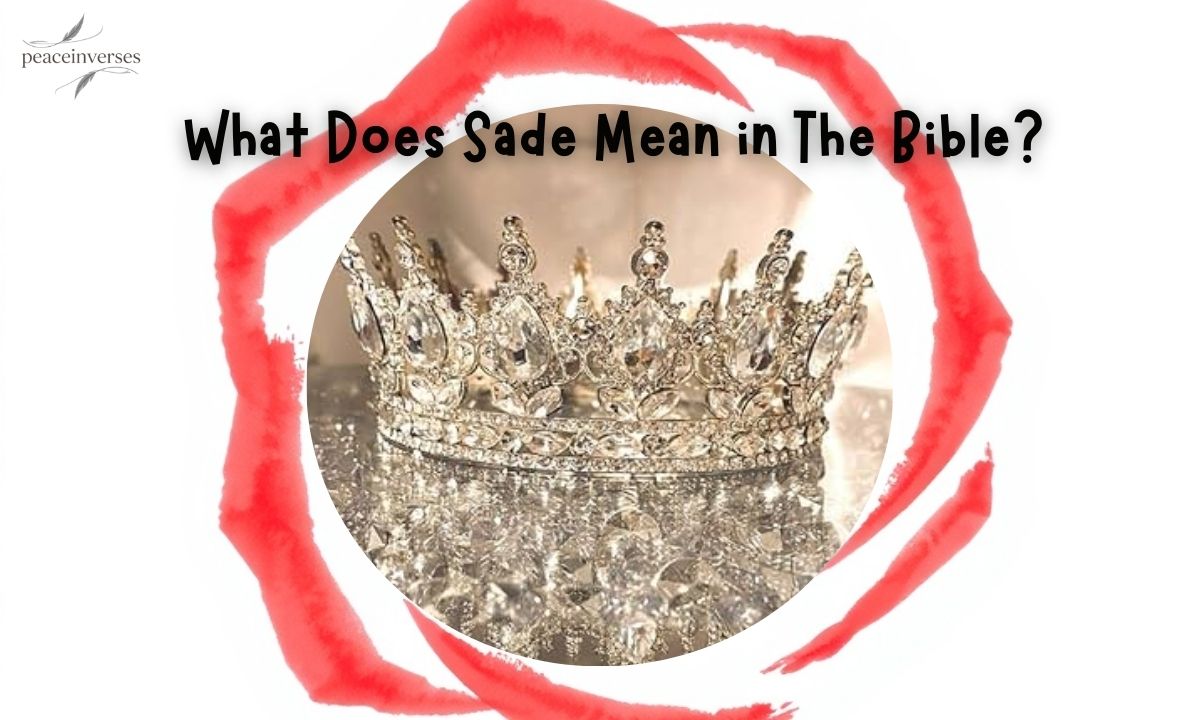What does the name Sade really mean, and how does it connect to the Bible? At first glance, this beautiful African-Yoruba name may seem distant from Scripture. Yet, its meaning—“honor confers a crown”—reflects timeless values that the Bible deeply treasures.
Though Sade is not directly mentioned in the Bible, its message speaks volumes. It points us toward dignity, respect, and worthiness, qualities the Bible praises in countless verses. Exploring this name reveals a powerful link between African heritage and biblical truth.
The Origin and Meaning of Sade
The name Sade comes from the Yoruba culture of West Africa. It is often a shortened form of the name Folasade, which means “honor confers a crown.” This phrase shows how deeply the Yoruba value respect and integrity.
In its meaning, Sade goes beyond a simple name. It carries the idea that dignity and noble actions give a person true recognition. Just as a crown symbolizes authority, Sade reminds us that honor is life’s highest reward.
Although Sade is not found in the Bible, its meaning connects with biblical principles. The Scriptures also teach that humility, respect, and good character lead to blessing and honor. This makes Sade a name that bridges culture and faith.
Sade in Yoruba Culture and African Traditions

The name Sade holds a deep place in Yoruba traditions. It is more than a personal name—it is a cultural philosophy. In this culture, names carry honor, dignity, and values passed from one generation to another.
Symbolism of Honor and Worthiness
In Yoruba belief, honor is like a crown that rests on a person’s life. A crown is not earned through wealth or power but through dignity and respect. This shows that a person’s actions decide their worth in society.
Sade teaches that worthiness is not given but built. It is gained through honesty, kindness, and noble deeds. Just as the Bible says in Proverbs 22:4, humility and the fear of the Lord lead to honor and life, Yoruba culture echoes the same truth.
Sade as a Reflection of Noble Character
The name Sade reflects character shaped by integrity. It inspires people to live in a way that earns lasting respect. For Yoruba communities, such values are the foundation of leadership and influence.
Sade reminds us that true greatness is measured by values, not titles. It calls individuals to pursue dignity, humility, and service. This reflection of noble character makes the name a guiding light for anyone who carries it.
Biblical Perspective on Sade’s Meaning
Although the name Sade is not directly mentioned in the Bible, its meaning reflects strong biblical values. The Scriptures consistently highlight honor, dignity, and humility as qualities that lead to blessing and respect.
Key Bible Verses About Honor and Dignity
The Bible teaches that honor comes through humility. In Proverbs 22:4, it says, “The reward of humility and the fear of the Lord are riches, honor, and life.” This verse perfectly matches the meaning of Sade, which connects honor to a crown.
Romans 13:7 also reminds us to “give honor to whom honor is due.” Respect and recognition are not optional but commanded by God. This verse highlights the importance of treating others with dignity and fairness.
We also see in Matthew 20:26–28 that true authority comes through service. Jesus teaches that greatness is found in humility and serving others. This principle mirrors Sade’s meaning, where noble character earns true respect.
How Sade Aligns with Biblical Principles
The meaning of Sade reflects biblical truths about integrity and character. Just as the Bible values honesty, respect, and humility, Sade symbolizes these same noble qualities. A crown of honor is not given lightly—it is the fruit of righteous living.
Proverbs 10:9 declares, “Whoever walks in integrity walks securely.” This verse shows how dignity is connected to trust and safety. In the same way, Sade reminds us that living uprightly builds a life of honor and stability.
The alignment between Yoruba tradition and Scripture shows the universal truth of honor. Whether in African culture or in biblical teaching, the message remains the same: a life of dignity leads to respect, influence, and lasting recognition.
The Cultural Significance of Sade in Africa

The name Sade carries deep cultural weight in Africa, especially among the Yoruba people. It is more than just an identity—it is a symbol of honor and dignity. Names like Sade pass on values from one generation to the next.
In African communities, names are chosen with care. They reflect the family’s hope and the community’s belief in noble virtues. Sade reminds people that true respect is earned through good character and honorable living.
Sade is celebrated because it reflects core African values. It teaches that life’s crown comes not from wealth but from dignity, honesty, and service. This name inspires individuals to live in a way that uplifts their people.
Key cultural values linked with Sade:
- Honor – Respect gained through actions and dignity.
- Integrity – Living truthfully and with character.
- Respect – Recognition within the family and community.
- Leadership – Influence that comes from service and humility.
Sade’s Modern Usage and Popularity
Today, the name Sade has moved beyond its Yoruba roots and is recognized around the world. It is loved for its unique meaning, elegance, and timeless quality, making it popular among modern families.
Influence of Singer Sade
One major reason for the name’s global recognition is the legendary singer Sade Adu. With her soulful music and graceful personality, she gave the name an image of elegance and beauty. This made the name widely admired.
Her artistry and fame connected the name Sade with class and timeless charm. Across cultures, people now associate the name with strength, creativity, and emotion. It is no longer just a traditional name but a symbol of inspiration.
Because of the singer’s influence, Sade has become a name linked to music, art, and culture. For many, choosing this name reflects not just tradition but also a sense of sophistication and global recognition.
A Name That Transcends Boundaries
The beauty of Sade is its unisex nature. It can be given to both boys and girls, offering parents a meaningful yet flexible choice. This inclusiveness makes it highly appealing in today’s world.
Across cultures, Sade stands for honor, dignity, and character—values that are respected everywhere. This universality has helped the name travel far beyond Africa into global popularity.
Parents today often choose Sade because it is short, memorable, and deeply meaningful. It carries tradition but also fits modern life, making it a rare balance of culture and contemporary style.
Conclusion
The name Sade beautifully connects Yoruba tradition with biblical values. Its meaning, “honor confers a crown,” reminds us that true dignity comes through integrity and humility. Both culture and Scripture affirm that a life of honor is worth more than riches.
Sade is more than a name—it is a philosophy of character and respect. It calls us to live in ways that inspire trust and admiration. By linking African heritage with biblical truth, Sade stands as a bridge between faith, culture, and identity.
Frequently Asked Questions
Does the name Sade appear in the Bible?
No, Sade is not directly mentioned in the Bible. But its meaning reflects strong biblical values like honor, humility, and dignity.
What is the cultural significance of the name Sade?
In Yoruba culture, Sade means “honor confers a crown.” It shows that dignity and noble character bring true respect and recognition.
How does Sade align with biblical teachings?
The Bible also teaches that honor comes through humility and integrity. Verses like Proverbs 22:4 match the meaning of Sade perfectly.
Is Sade a popular name today?
Yes, Sade is now a global name. It is used for both boys and girls and gained worldwide recognition through the singer Sade Adu.

